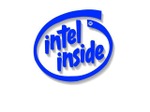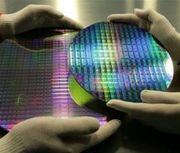Thanks to Moore’s Second Law, which holds that as chips get exponentially more complex they get exponentially more expensive to make, chip companies like Intel have become huge, of necessity. (Moore’s Second has also been steadily shrinking the pile of chip companies, with AMD the latest victim.)
Huge companies are hard to turn around. Intel announced back in 2004 it would concentrate on low-power designs. That effort is only now starting to bear fruit.
The fruit is in the form of what’s called a Quad Core Xeon chip. As the name implies, this is four chips on the same sliver of silicon, a design advance pioneered by rival AMD. The news, for those who follow The War Against Oil, is that these are server chips, meant to go into powerful computers that are on all the time, and they draw just 50 watts each.
The decision to go with low power design wasn’t made with The War
Against Oil in mind. It was made to reduce heat built up on the chips
from all that electricity traveling in circuit lines just dozens of
nanometers apart.
But the decision is still going to have a powerful
impact. Computers and networks are among the biggest users of
electricity on the planet today. Because networks run all the time they
put a constant load on generating systems. (Most loads are heaviest
during the day, when people are awake.)
But here’s where things get really interesting. Some of the biggest
users of computing resources on the planet, like Google, deliberately
use relatively older, low-power chips to save money. They use the same
parallel-processing technology Intel has on this chip to get a lot of
bang with cheap boxes, per buck.
The problem is that low computing power chips are also energy hogs,
compared to the present designs. Intel’s new move may push companies
like Google to upgrade their servers in order to capture electricity
savings. This is good for Intel, it can be very good for Google, and
it’s a win for the environment and The War Against Oil as well.













More efficient chips are actually a double victory because, not only do they require less energy to function, but they require less energy to be expended keeping them cool.
More efficient chips are actually a double victory because, not only do they require less energy to function, but they require less energy to be expended keeping them cool.